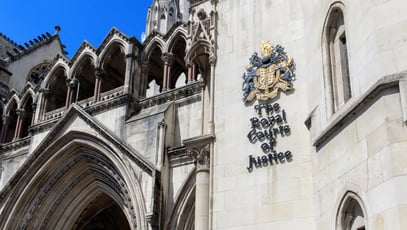This month’s Red Flag Bulletin includes the following stories:
- Son of Brazilian President Jair Bolsonaro charged with embezzlement and money laundering in high-profile corruption scheme;
- US sanctions Iranian charitable organisation believed to benefit Supreme Leader Ali Khamenei; and
- Hearings begin in trial of Nicolas Sarkozy on charges of corruption and influence peddling.
Americas
Mexico: Senate approves amendment allowing financial crime unit to freeze accounts without judicial approval
On 18 November, the Mexican Senate passed an amendment to the country’s Credit Institutions Law allowing the Financial Intelligence Unit (UIF), the Mexican Ministry of Finance’s financial crime division, to freeze bank accounts without first obtaining a judge’s order. Under the amendment, the UIF can instruct financial institutions to block any accounts associated with individuals it is investigating for money laundering or terrorist financing. Banks are responsible for informing their clients of the account freeze, and customers affected have the right to submit an appeal directly to the UIF. The reform is expected to be approved by President Andrés Manuel López Obrador whose political party, Morena, controls both chambers of the Mexican legislature.
Peru: Corruption allegations provoke change of president for the second time in three years
On 9 November, the Peruvian Congress impeached President Martín Vizcarra following accusations of corruption relating to the award of engineering contracts during his term as governor of Moquegua, southern Peru, from 2011 to 2014. Vizcarra became president in 2018 after his predecessor, Pedro Pablo Kuczynski, resigned amid allegations of corruption. Protesters and political commentators have denounced the removal of Vizcarra, who enjoys 60-percent approval ratings, as a coup d’état organised by the opposition-controlled Congress whose interests have reportedly been jeopardised by Vizcarra’s policies. On 17 November, Congress elected Francisco Sagasti, an academic and former World Bank official who had opposed Vizcarra’s impeachment, as Peru’s interim president until new elections are held in April 2021.
Brazil: President Bolsonaro’s son charged in corruption investigation
On 4 November, Brazilian prosecutors charged Flávio Bolsonaro, a senator who is the son of Brazilian President Jair Bolsonaro, with embezzlement and money laundering. On 25 November, Fabricio Queiroz, a family friend of Bolsonaro and a former aide to Flávio, admitted to federal prosecutors that he had been part of a long-running embezzlement scheme involving Flávio’s Senate staff. Queiroz admitted that advisors he had appointed, including his family and friends, had agreed to “hand over” part of their salary in return for their roles. According to prosecutors, Flávio’s Senate staff had transferred most of their salaries to Queiroz and Flávio. Bank records indicate that Brazil’s first lady may also have benefited from the scheme. Prosecutors dismissed Queiroz’s claim that Flávio had been unaware of the scheme as “not credible”. The corruption scandal is seen as the most significant of Bolsonaro’s presidency.
Russia and CIS
Russia: Authorities target Navalny’s Anti-Corruption Foundation with new criminal case
On 5 November, Russian authorities raided the Moscow office of the Anti-Corruption Foundation (FBK), a Russian non-profit established by Russian opposition politician and anti-corruption activist Alexey Navalny. They also opened a criminal case against its director for failing to implement a court order issued against FBK in 2019. In October 2019, a Moscow court found that an FBK investigation revealing malpractice at the Moscow Schoolchild, a catering company supplying schools and nurseries, constituted libel. It ordered FBK and Navalny to each pay USD 374,483 to the Moscow Schoolchild. In July 2020, Navalny announced the closure of FBK as it was unable to pay the compensation mandated by the court. Independent Russian media outlets have claimed that the lawsuit and raid were motivated by Navalny’s longstanding opposition activities and FBK’s targeting of Evgeniy Prigozhin, a prominent Russian businessman connected to the Moscow Schoolchild.
Asia Pacific
Indonesia: Businessmen investigated and sentenced in connection with losses at state insurance companies
On 10 November, Indonesian media reported that authorities were investigating Benny Tjokrosaputro and Heru Hidayat, two prominent businessmen, for their potential role in causing over USD 700 million in losses at Asabri, a state-owned insurance company for the military. On 27 October 2020, Tjokrosaputro and Hidayat received life sentences for their role in a stock manipulation scheme that contributed to losses of over USD 1 billion at Asuransi Jiwasraya, a state-owned life insurer. They were also handed restitution orders in excess of USD 400 and 500 million after Indonesia agreed to inject USD 1.5 billion into Jiwasraya. The scandal is among a number of recent defaults due to poor corporate governance that have undermined confidence in Indonesia’s financial markets.
India: Allegations of fund siphoning at Vedanta
On 11 November, London-based hedge fund Kyma Capital published a letter requesting that listed Indian commodities producer Vedanta Limited recall a USD 956 million loan to its parent Vedanta Resources Limited, which is controlled by Indian billionaire Anil Agarwal. Kyma, which owns less than 1 percent of Vedanta Limited, alleged that the loans were a “siphoning off of funds” from the listed vehicle designed to help finance Agarwal’s failed attempt to take Vedanta Limited private. Vedanta Limited had previously described the loans as part of its “cash management activities”. Kyma stated that it is in the process of filing a complaint with India’s financial regulator, citing broader corporate governance concerns. Since its failed takeover of Vedanta Limited in October, Vedanta Resources has been seeking to alleviate its considerable debt burden; on 26 November, it began consulting bondholders about extending maturities on bonds totalling USD 670 million due in June 2021.
Singapore: Executives of firearms-training company probed for corruption
On 15 November 2020, Starburst Holdings, a listed Singaporean company specialising in firearms-training facilities, announced that three executives were on bail amid an investigation by the Corrupt Practices Investigation Bureau (CPIB). According to a follow-up statement by Starburst, executive chairman Edward Lim Chin Wah and managing director Yap Tin Foo, who between them own almost 70 percent of Starburst, were being investigated for offences pertaining to “corrupt transactions with agents”, while a senior project manager was being investigated for abetting the suspected wrongdoing. Starbust CFO Wu Guangyi was also interviewed by the CPIB but not arrested. According to Starburst, the investigation is not related to its current projects. Starburst’s share price initially fell 65 percent on news of the investigation, but has since made a partial recovery.
Middle East and North Africa
Iran: US sanctions foundation linked to Ayatollah Ali Khamenei and Intelligence Minister
On 18 November, the US Treasury Department imposed sanctions on the Islamic Revolution Mostazafan Foundation (IRMF), a large charitable organisation with 160 holdings in Iran’s energy, mining, construction, and finance sectors, including in Behran Oil, which exports oil to the regime of Bashar Al Assad in Syria. IRMF is led by Parviz Fattah, a former leader of the Islamic Revolutionary Guard Corps (IRGC), a sanctioned elite unit of Iran’s armed forces. IRMF purports to provide benefits to vulnerable and impoverished members of Iran’s population, although the US Treasury claims that it is in fact used by Supreme Leader Ali Khamenei to “enrich his office, reward his political allies and persecute the regime’s enemies”, including through the confiscation of property owned by religious and ethnic minorities. Washington also imposed sanctions on Iran’s Minister of Intelligence and Security and two IRGC officials for their involvement in human rights abuses.
Iraq: Australian national charged in connection with Iraq bribery scandal
On 18 November, Australian police arrested Russell Waugh, a former executive of Australian construction conglomerate Leighton Holdings, for his alleged involvement in a USD 1 billion corruption scheme in Iraq. Waugh is reported to have overseen the payment of bribes to senior Iraqi politicians, including a former deputy prime minister, via Leighton Holdings’ offshore subsidiary to secure oilfield contracts worth over USD 1.3 billion. The investigation into Leighton Holdings and its subsidiary has been ongoing since 2010, and Australian authorities have thus far identified suspicious payments of over USD 77.6 million made by the companies to Iraq’s state-owned South Oil Company and Ministry of Oil, both of which are responsible for approving oil contracts. The companies are reported to have used a Jordanian national known as “the Doctor” and Unaoil, a Monaco-incorporated company, as facilitators, transferring funds for kickbacks to accounts in the UAE.
Sub-saharan Africa
South Africa: Secretary General of governing party faces multiple corruption charges
On 10 November, South African authorities issued an arrest warrant for Ace Magashule, the secretary general of South Africa’s governing African National Congress (ANC), on multiple charges of corruption, fraud, and money-laundering. The charges relate to payments linked to an asbestos audit contract awarded by the government of Free State province, eastern South Africa, in 2014, while Magashule was the province’s premier. Businessman Edwin Sodi, whose company was a partner in the joint venture that secured the contract, has also been arrested. Magashule and his co-accused were granted bail, with the next court appearance scheduled for February 2021. Magashule has repeatedly stated he will not step down as ANC secretary general, and his arrest has raised questions regarding the party’s resolution that leaders facing serious charges should step aside from their roles pending the outcome of investigations.
Europe
France: Sarkozy on trial for corruption and influence peddling
On 30 November, hearings began in the trial of former French President Nicolas Sarkozy on charges of corruption and influence peddling. Sarkozy is accused of seeking to bribe a senior judge with the offer of securing him a prestigious post in Monaco in exchange for information on a separate criminal case regarding the suspected illegal financing of Sarkozy’s 2007 presidential campaign by Liliane Bettencourt, the late L’Oréal heiress. If convicted, Sarkozy faces up to 10 years in prison and a fine of up to EUR 1 million. Sarkozy is the subject of a number of other ongoing investigations by the French authorities, including into allegations that he received financing for his 2007 presidential campaign from the late Libyan dictator, Muammar Gaddafi. He is also due to stand trial in March 2021 on charges of illegal financing of his unsuccessful 2012 presidential campaign.
EU: European Commission accuses Amazon of antitrust violations
On 10 November, the European Commission published a preliminary decision that Amazon violated EU competition rules. Following a year-long antitrust probe into Amazon’s use of third-party vendor data, the Commission found that Amazon had collected non-public data from approximately 150,000 European vendors using its global marketplace, and that it had used this data to adjust its offers, promoting products from its own brands to the detriment of these vendors. The EU also announced a separate formal antitrust investigation into Amazon’s e-commerce processes on suspicion that it gives preferential treatment to its own products and to sellers who have paid premiums for Amazon’s logistics and delivery services. German authorities opened an antitrust investigation into Amazon in late October 2020, with a similar focus on the company’s use of data collected from its marketplace.




